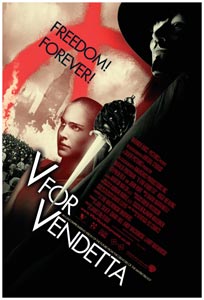Wednesday, April 19, 2006

Title:V For Vendetta
Cast: Natalie Portman, Hugo Weaving, Stephen Rea, Stephen Fry, John Hurt, Tim Pigott-Smith, Roger Allam
Director: James McTeigue
Evey Hammond works for a TV company, and is risking the curfew to meet her boss for dinner. Unfortunately she is caught by agents of the government's secret police, who are going to have their wicked way with her. However she is rescued by V, a man in a Guy Fawkes mask, who then escorts her to witness the blowing up of the Old Bailey and Lady Justice. While the police are unable to identify the man in the mask, they are able to identify Evey Hammond.
So the police come for her at work - the TV station - the place that V is in the process of attacking so that he can broadcast his message to the country. The current regime has had long enough, it has come to power using the excuse of terror, and now uses terror to maintain power - one year from today V will blow up parliament, those that agree with him should gather and show their support. In the confusion that follows Evey saves V from the police, only to be knocked out - forcing V to take her with him and hold her until his plans are completed.
The rest of the film covers a year - the 5th of November to the 5th of November. A year of growing unrest. A year of authoritarian discomfort. In that time V picks off a number of important people, the police piecing together the story a step behind each new murder.
From the first paragraph, anyone familiar with Alan Moore and David Lloyd's book V For Vendetta should be able to spot that there are differences in the plot to this film adaptation written by the Wachowski Brothers. To a degree this is to be expected, Moore extrapolated from events in the 1980's to give a fascist state a few years later, the Wachowski's have done similar from the present. Rather than Moore's nuclear incident, we have a bio-terrorist attack that has changed the face of politics as people responded to events. The idea of terror is perhaps even more relevant to today's politics than the politics of when the book was originally written. As such it plays a bigger part in this film - the story just about jumps up and down shouting about the politics of manipulation, the politics of exploiting terror to take power, of how the destruction of just one building can change everything. Though the irony is, the destruction of a building got us into the political state we are, while the film suggests the destruction of one building will sort everything out.
As an adaptation V For Vendetta is at its best when it is closest to the source material. When Hugo Weaving is allowed to play V as an over the top and flamboyant character he is brilliant. Where he has to apologize or explain himself to Evey he is weakened and undermined. Even more so when the film tries to develop more between V and Evey. Some of the tensions and twists of the book are removed, which to a degree is understandable as films usually strip down some. Though this seems to provide more space to make political noises again. The changes in the character Gordon who Evey uses for shelter are interesting - to a degree in the book he added a seediness, mixing in with the overall conspiracies, here Stephen Fry plays him as a closet gay television host, which instead adds emphasis to some of the extremes of the establishment and their reactions to race and sexuality. Something that was already a strong theme in the book.
There are undoubtedly flaws with V For Vendetta. The periodic moments of violence, which owe too much to The Matrix, and aren't in keeping with the film as a whole. Or the entirely over the top prison camp scene, which we flashback to on a number of occasions. However Weavings V, Stephen Rea's Finch, and Portman particularly during Evey's forced awakening, all balance the scores. Indeed, while it isn't necesarily saying much, V For Vendetta is undoubtedly the best adaptation of one of Alan Moore's books to date.
Comments:
Post a Comment
 this is the voice of re:mote induction.
this is the voice of re:mote induction.